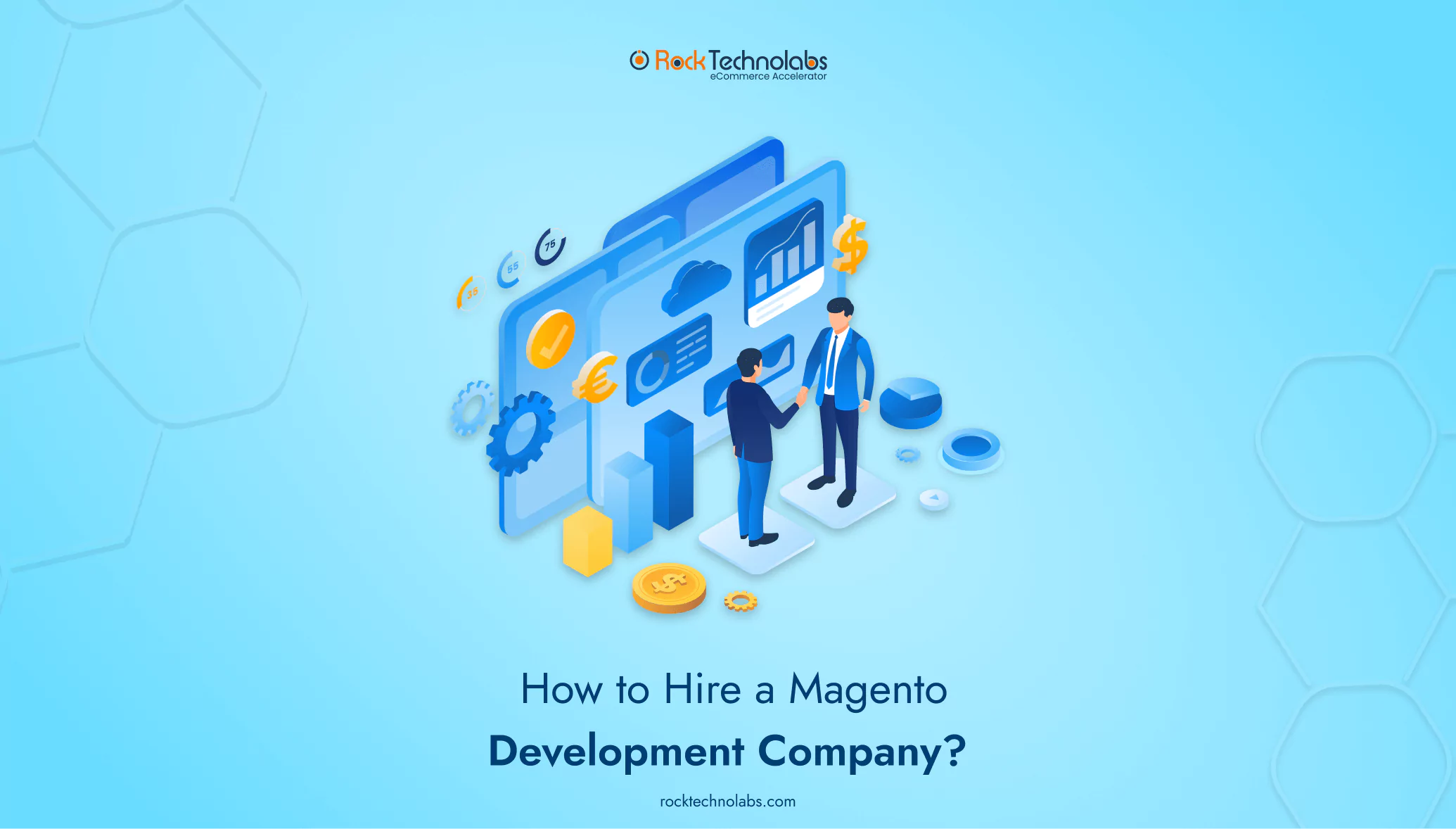How to Hire A Magento Development Company?

You can’t run an online business without having a robust, engaging, and intuitive store. Stores are the basic foundation of your business, and without this sales/conversions can’t take place. It’s true that there are thousands of e-commerce companies that help in establishing the e-commerce store, but how many of these companies create stores that generate sales?
Today, when there are millions of stores across the same industry and multiple vendors are offering the same product, just a missing functionality or a few seconds of delay can persuade your prospective customers to land on the competitor’s Magento website.
Therefore, choosing the right development partner is essential so you won’t get a store that only exists on Google but doesn’t bring anything valuable. However, the question arises how you will choose a Magento development company that understand your requirement, your brand unique identity, your short-and long-term goals, and differentiates it can from your opponents, plus loved by the users as there are countless agencies exist who claim to be an expert with years of experience even when they didn’t done more than 5 projects in a year, thus it’s easy to feel overwhelmed.
To get you rid of this headache – we have given enough details in this blog so you can walk through the key steps, questions, and criteria to confidently hire a Magento partner who aligns with your technical needs, business goals, and long-term vision.
Which Factors Matter Most When Hiring a Magento Agency?
1. Magento-Specific Expertise & Certification
Most of the reliable and well-known agencies only hire developers with certifications so it would be better if you prioritize agencies that are Magento-Certified Solution Specialists, Front-End Developers, or Developers. Adobe offers Adobe Commerce certifications to validate the skills and expertise of professionals working with Adobe Commerce, previously known as Magento. Thus ensuring that the company you are working with have a team of developers who are certified can guarantee that they will adhere to Magento standards and best practices.
2. Range of Services
In the highly competitive ecommerce world, many merchants need companies that offers end-to-end services not just Magento development, such services include Magento ERP integration, shipping integrations, hyva theme development, Magento 2 migration, Magento upgrade services, extension development, and Magento support & maintenance.
Besides this, many agencies also offer strategy, advertisement, and hosting services, so opt for them, and avoid short-term vendors who only do one-off theme tweaks. Instead, look for partners who offer comprehensive services including performance optimization, speed optimization, third-party software integrations, custom development, and security audits.
3. Portfolio & Client References
Would you like to purchase vegetables from a shop where there are not enough veggies, or other people do not prefer to buy from the same shop? In the same manner, choosing a Magento development company without going through the work they have done before is kind of foolish. Because how to ensure that they are able to offer what you desire, and whether they have enough expertise to deliver the project.
You have to see real-world results, that’s why review the portfolio of Magento companies you are approaching for Magento 2 migrations, high-traffic storefronts, and international e-commerce setups. Then ask for references and call at least two recent clients.
4. Cultural Fit & Communication
It’s true that Magento development isn’t a rocket science must still your business growth rely on it, that’s why you must pick companies that truly understand your brand’s mission, tone, and customer base will design and develop stores that reflect your identity because they aren’t just going to write code—they’ll collaborate regularly with your team. Moreover, there are chances that you choose the same agency that developed your store, therefore they more likely to become trusted long-term partners, proactively understanding your evolving goals and business landscape. Assess:
- Language proficiency
- Meeting cadence and responsiveness
- Availability across time zones
- Project visibility (Do they use tools like Jira, Trello, Slack?)
5. Pricing Model & Transparency
Creating a Magento store and hiring a Magento development agency is going to be a huge investment for your business, and like any significant business decision, it requires due diligence. Later, to avoid misunderstanding, understanding how an agency charges for its services and how openly it communicates about costs, deliverables, and expectations is crucial.
Moreover, different Magento development companies offer different pricing models, vary—fixed-price bids, time-and-materials contracts or retainer agreements are common, plus each of them has its own pros and cons:
- Fixed price gives predictability, but can lead to scope rigidity
- Time-and-materials allows flexibility but requires oversight
- Retainers smooth out support costs for ongoing work
Freelancer vs. Agency: Which is Best for Magento Projects?
1. Depth of Expertise
- Freelancers: Freelancers are mostly specialists in a particular area of Magento development, it could be custom development, hyva theme development, third-party integrations, or support and maintenance.
Moreover, most of them operate alone, thus lack a comprehensive understanding of the entire Magento ecosystem—such as DevOps, QA testing, UX design, or backend scaling strategies. Therefore, you can hire them for small tasks or fixes.
- Agencies: Agencies or companies have a whole certified team of experts who work collaboratively on a project, thus bringing the collective strength of all people in one place—frontend, backend, QA, DevOps, and designers.
2. Coverage & Scalability
Small or mid-sized projects should be given to freelancers in case the project scope is limited as they can handle smaller tasks efficiently, but major projects often require multiple specialists; therefore, they must be handed to agencies because they can quickly scale their team as per the requirement.
Plus, Magento development companies are typically operate under internal documentation and version control systems, ensuring that no knowledge is siloed with one individual. Also, due to any reason if a lead developer becomes unavailable, other team members can step in—ensuring continuity.
3. Project Management & Structure
- Freelancers are not going to work for you only; they have multiple clients, and they single-handedly give all attention to all projects, so there are chances that your project may be deprioritised when a lucrative opportunity knocks on their door—or worse, go silent in the middle of development.
- Agencies provide more accountability as compared to freelancers as they mostly operate under a service level agreement, plus such Magento development companies assign different managers to different projects, so these formal processes result in —discovery workshops, sprint planning, regular status updates, and QA protocols—minimising miscommunication and delays.
4. Reliability & Accountability
- Freelancers may disappear or deprioritize your work if they land bigger projects.
- Agencies usually commit to SLAs and maintain professional accountability. Contracts, cover letters, and support agreements mitigate risk.
5. Cost Comparison
- If you have small tasks and your budget is low, then freelancers are better options as they typically have lower hourly rates or charge very affordable rates, which makes them attractive for startups, early-stage companies, or businesses with limited budgets.. But fragmented workflows—onboarding multiple freelancers for design, dev, QA—can accrue management overhead and integration issues.
- On the other hand, agencies are truly more expensive as they ask for a reasonable value for complex and prolonged period of projects, but they often deliver higher quality and more reliable timelines. If you are worried about hidden costs, then directly ask them; agencies are usually more cost-effective for complex projects.
6. Ideal Use Cases
Choose a freelancer when:
- Your need is narrowly defined (e.g., theme tweak, performance fix)
- You have internal technical leads for oversight
- You’re on a tight budget and can handle some risk
Choose an agency when:
- You’re launching a full-featured Magento store
- You require custom integrations (ERP, CRM, marketplaces)
- You expect high traffic, scalability, and future enhancements
- You need long-term support and maintenance
How to Verify the Expertise of a Magento Developer
1. Check Magento Certification
Verified credentials matter. Look for official Magento Certification badges:
- Magento 2 Certified Solution Specialist
- Magento 2 Certified Developer
- Magento 2 Certified Front-End Developer
Ask the candidate to share their certification ID or certificate URL. You can crossverify this on Adobe’s certification registry.
2. Review Portfolio & Code Samples
Ask for live store examples or code repositories. Assess:
- Do they follow Magento’s module structure and coding standards?
- Are their extensions easily installable/configurable?
- Do they implement clean separation of concerns, use DI, plugins, observers, and less overwrites?
3. Technical Interview & Code Challenge
Structure a coding task (e.g., custom extension to modify order email content) and ask them to:
- Write clean, tested code
- Use Magento conventions (namespace, composer, XML, dependency injection)
- Add unit tests (PHPUnit) or integration tests
During the interview:
- Explore concepts like dependency injection, the plugin architecture, frontend Knockout.js usage (if relevant), caching (Varnish, Redis), and Magento events/observers
4. Assess Problem-Solving Skills
Magento complexity lies in integrations, scaling performance, upgrade paths. Scenario-based questions reveal their depth:
- How would you diagnose a slow checkout funnel?
- How would you integrate with an ERP and manage data synchronization?
- How would you approach a Magento version upgrade to 2.4.x, ensuring database and extension compatibility?
5. Verify References & Past Work
Talk to former clients or employ retirement and ask:
- Was the developer proactive in communication and bug resolution?
- Did they meet deadlines and budgets?
- Did their code require major revision during QA?
If possible, run static code analyzers (e.g. PHPStan, SonarQube) on their demo code to objectively check for coding issues.
Wrapping Up
Hiring a Magento development company is not a difficult task, however it’s a strategic move above which lies the foundation of your online sales, as we mentioned above your choose Magento development agency task would be more than just working with codes, theremore they must understand your brand, business goals, customer expectations, and the nuances of high-performance eCommerce operations.








